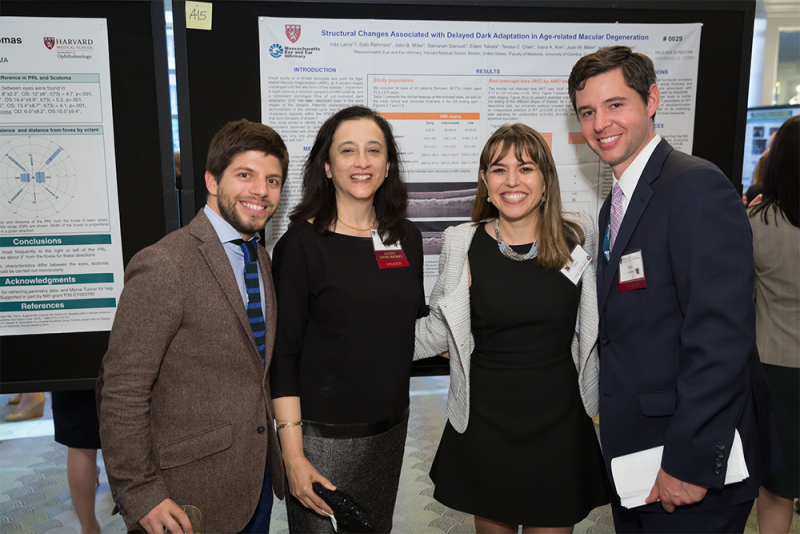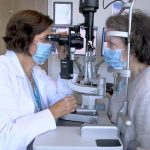A young medical scientist from Portugal teams up with a lab at Mass. Eye and Ear in their pursuit to identify biomarkers of age-related macular degeneration (AMD)
Ines Lains’ passion for ophthalmology began in Portugal, her home country, where she began a project that led her to a research fellowship opportunity at Mass. Eye and Ear.
“I think that vision is the most beautiful and complete sense that we have. That’s how we see and experience the world!”
Using imaging and complex statistical analysis, Dr. Lains is on a quest for biomarkers in age-related macular degeneration (AMD), the leading cause of blindness in people over 50-years-old. These biomarkers — biological signs captured within standard lab tests — will potentially help with an early diagnosis and will support prognosis.
“It is frustrating that you cannot tell someone what to expect,” said Dr. Lains. “We don’t have reliable ways of explaining to patients what they can expect after being diagnosed. You can either go blind or your vision can just stay the same. There is not much more information that we can offer.”
Joining a team

With a grant she received from the Harvard-Portugal Program, Dr. Lains joined Mass. Eye and Ear mentors Dr. Joan Miller, Chief of Ophthalmology, and retina surgeon Dr. Deeba Husain, in a project comparing samples of blood and urine in healthy subjects to those with macular degeneration.
Using a technique known as “metabolomics,” or the study of the tiny particles in our blood that reflect our genes and environment, they hope to identify biomarkers of macular degeneration that can indicate the disease in a routine lab test, potentially leading to earlier diagnoses for patients, and ultimately, more treatment options in the future.
“There is much potential to improve our knowledge of this disease,” said Dr. Lains. “Besides identifying biomarkers, we are trying to build networks to relate the different risk-factors for AMD, and to try to understand what’s in between.”
Pathways to a bright future
Dr. Lains hopes to continue improving vision for patients, working toward a career with time spent in both a research laboratory and caring for patients.
“While in clinical practice, I can really understand what are the patients needs,” she said. “From there, I can go to the lab and develop these research questions and, ideally, put any knowledge gained back into practice.”
Dr. Lains suggests to future scientists and doctors who are interested in clinical research to start as early as possible. She feels it is important to have a good background in your field, to know how to design and complete a study and to know how to communicate and collaborate with others on your team.
“The more you are exposed to your field of choice, the better,” Dr. Lains said. “This fellowship is a huge opportunity to develop my skills and to bring new knowledge in such a serious illness.”




Inês ,i love you, you’re the best!!! Congratulations. I’m feeling proud of you!
I am so moved to read about your wonderful work, Ines. Not only your ophthalmology research and clinical work, but I feel you serve as an Ambassador from Portugal to bring the very important work about cultures working together, to our medical organizations here in America, especially in these troubling times. Thank you for all of it1